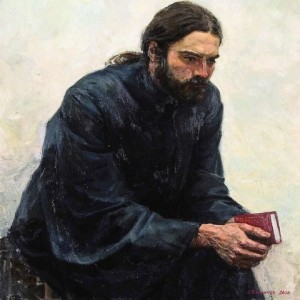Philokalia Ministries
Episodes
Monday Aug 13, 2018
Monday Aug 13, 2018
Tonight we concluded Homily 46. St. Isaac again expresses the centrality of the holy Eucharist in giving us the strength to live and love as Christ desires. It is through the love that we receive at his hand that we are transformed. In Christ, the sinful, the sick and the hopeless find the desire for holiness, healing and trust in the promise of the Kingdom.
In Homily 47 St Isaac begins to discuss the distinction between natural and spiritual knowledge. We have all been gifted with the capacity to discern between good and evil. This natural knowledge, pursued and fostered, prepares us to receive the gift of faith and so the knowledge of God. If neglected however we will find ourselves impoverished, less than what we are to be as human beings; more like animals than those who have been made sons and daughters of God. We must live in a constant state of repentance, allowing it to draw us back to God and to the full measure of our humanity. Only then can we be raised up to share in the fullness of the life of God and experience the hope of eternity.
Thursday Dec 08, 2016
The Ascetical Homilies of Saint Isaac the Syrian - Homily Three Part II
Thursday Dec 08, 2016
Thursday Dec 08, 2016
St. Isaac begins homily three by making an argument that the passions are not natural to the soul. The soul by nature is pure and virtuous. Its contranatural state is to be moved by the passions that arise from the sense and appetites of the body. It is then in a state of illness. There is a distinction, I believe, that Isaac is making between desire and the passions. Desire for God is not the same as being passionate as is so often described in popular conversation. We wrong attribute and project onto the soul things that are not proper to it in its natural state.
A rather spirit discussion arose about seeking a life of dispassion in the world. Is desert living and the struggle appropriate and possible for those living in the world? What discipline is needed to live distinctively as Christians in the world?

Wednesday Apr 13, 2016
Wednesday Apr 13, 2016
As we come to the end of Conference 21, Abba Theonas raises the bar for us in terms of how we understand our lives as Christian men and women. He presents us with a magnificent comparison between focusing on our lives in a legalistic fashion (fulfilling certain precepts and obligations) and seeing our lives as being caught up in the grace of God and transcending the limitations of the law in every way.
Sin is to have no dominion over us for the love of God has been poured out into our hearts by the Holy Spirit. Every disposition to sin is to be something absolutely foreign to us since all our concentration and all our longing is constantly fixed upon the divine love and to such a degree that we do not take delight in base things and do not even make use of those things that would normally be conceded to us by our own judgment and that of the world's. The grace of the Savior is to inflame us with a holy love of incorruption which burns up all the thorns of evil desires such that the dying ember of vice does not diminish our integrity in any way.
This is something that must be experienced to be understood fully. The purity of heart and the all consuming love for God and the love virtue is rarely tasted in our day. May God fill us with the desire for it!

Thursday May 21, 2015
Conferences of St. John Cassian - Conference Twelve on Chastity Part IV
Thursday May 21, 2015
Thursday May 21, 2015
Chaeremon concludes his conference on Chastity by presenting us with images of perfect chastity; yet, he acknowledges that such descriptions fall short and can only be understood not through words but through the experience of those who have sought the virtue and tasted its sweetness. Once again, he emphasizes that while the pursuit of this virtue requires nothing less than a complete response on the part of those seeking it, It is only through the grace of God that it is ultimately obtained and preserved. In fact, Chaeremon notes that believing in the absolute importance of grace is almost as difficult for the beginners in the spiritual life as is the perfection of chastity itself.

Thursday May 21, 2015
Conferences of St. John Cassian - Conference Twelve on Chastity Part IV
Thursday May 21, 2015
Thursday May 21, 2015
Chaeremon concludes his conference on Chastity by presenting us with images of perfect chastity; yet, he acknowledges that such descriptions fall short and can only be understood not through words but through the experience of those who have sought the virtue and tasted its sweetness. Once again, he emphasizes that while the pursuit of this virtue requires nothing less than a complete response on the part of those seeking it, It is only through the grace of God that it is ultimately obtained and preserved. In fact, Chaeremon notes that believing in the absolute importance of grace is almost as difficult for the beginners in the spiritual life as is the perfection of chastity itself.

Thursday Apr 30, 2015
Conferences of St. John Cassian - Conference Twelve on Chastity Part II
Thursday Apr 30, 2015
Thursday Apr 30, 2015
As we sat at the feet of Abba Chaeremon with Cassian and Germanus, we continued this most important conference on Chastity. We began by considering the presence or absence of the other passions, especially anger, as a barometer of the depth of a person's chastity. The Lord must destroy all inner wars between the flesh and the spirit and no one will enjoy this virtue enduringly in whose flesh there still rages these battles. When the Lord has freed the person from every seething emotion and impulse, he shall attain to the state of purity. However, there can be no peace while the struggle continues. We must not boast, then, at some small measure or period of chastity. In fact, until a person arrives at the state of perfect purity he has to be trained frequently by enduring patiently inner discrepancies and until he acknowledges fully the truth that God alone can lift a person out of the pit of wretchedness. Chaeremon, then, went on to discuss the various degrees of chastity in detail and the deepening of freedom that comes with each stage. We cannot define the purity that God desires for us in accord with human standards or measures. Nor can we think that simply because something is tied to human nature and natural bodily movements that they are somehow beyond moral judgment or have no moral value. Discussion then ensued about the cultural, educational and psychological implications of Cassian's teaching.

Thursday Apr 09, 2015
Conferences of St. John Cassian - Conference Eleven on Perfection
Thursday Apr 09, 2015
Thursday Apr 09, 2015
Cassian describes his initial travels to Egypt with Germanus and their first encounter with Abba Chaeremon, and man of great age and holiness and seek a word from him regarding the path to perfection. Acknowledging their desire for God, the old man agrees and settles down to speak of the three things that forestall vicious behavior, namely, fear of punishment, hope of reward, and love. To the three checks on evil there correspond three virtues - faith, hope and love. The virtues in question are all directed toward a good end, to be sure, but they are not all equally excellent, for they correspond in turn to three significantly different states: Fear belongs to the condition of a slave, hope to that of a hireling and love to that of a son. Only those who have attained to the image and likeness of God may be numbered in the third state, which is the noblest. Persons who avoid vice out of fear are far less stable in virtue than are those who do so out of love. The former acts as if coerced and when the coercive element is no longer present they cease to be attracted to the good. The latter, however, are drawn to the good for its own sake. Persons who are moved by love also will have in particular the gift of compassion for others in their weakness, realizing that they themselves are utterly dependent upon divine mercy and grace.

Wednesday Sep 17, 2014
Wednesday Sep 17, 2014
Cassian and Germanus seek out the guidance of the elder Serenus, whose name captures his character. Serenus had attained great purity of heart, peace, and freedom from the carnal desires of the flesh. Cassian and Germanus come to him in a state of despair; for although having labored for years they found their thoughts wandering and pulling them back to the things of the world and the passions. In their desolation they had begun to give up any hope of attaining such virtue and complain to Serenus that it is their nature that has prevented stability of mind and heart. Serenus in both his teaching and example is becomes the cypher though which we are meant to come to understand both the path to and nature of purity of heart. It is desire and thirst for God alone that can bring us to this freedom. Faith, Hope and Love are the weapons we use to engage in the battle (the theological virtues that have God as their end) and the depths of the heart is purified by the sharp sword of the Spirit. Once again the discussion was thoughtful and enriching and Cassian’s insights immeasurably valuable.

Wednesday May 14, 2014
Conferences of St. John Cassian: Conference Three on Renunciation -Part IV
Wednesday May 14, 2014
Wednesday May 14, 2014
We continue to follow Cassian as he discusses the relationship between grace and free will. God is not only the beginning and end of all things but his grace is the source of our growth in virtue and our rising out of vice when we have fallen. Our free will is used to embrace that grace in obedience or to turn away from it. Discussion then ensued about the importance and centrality of desire in the spiritual life. Christianity in its essence is relational and we create an illusion when we make the ascetical life about the performance of a muscular will as opposed growing in the freedom to embrace the grace that God offers us in love.

Wednesday Jan 08, 2014
Ladder of Divine Ascent - Step 28 On Prayer Part I
Wednesday Jan 08, 2014
Wednesday Jan 08, 2014
As we noted in the beginning of our study of The Ladder, the goal of all spiritual labors is communion with God. We do not seek an abstract vision of the Divine, nor do we labor for a legal verdict declaring us "not guilty." Rather, we aim at communion and union; we set our sights on the true, intimate knowledge of God which is "life eternal" (John 17:3). According to St. John, prayer must be looked at as both the means to and the achievement of this knowledge. The goal of prayer is God. This is important to note as we begin. In prayer and through prayer we seek Him. How easy it is for us to reduce prayer to the fulfillment of some external "rule of prayer" which must be completed before we can continue on with the fulfillment of our other "external" requirements. The great tragedy of our spiritual lives is that prayer itself can become part of this "world and its ways" rather than an abandonment of this world so as to pursue the next. "Rise from the love of the world and the love of pleasure. Put care aside, strip your mind, refuse your body. Prayer, after all, is a turning away from the world, visible and invisible. What have I in heaven? What have I longed for on earth besides You? Nothing except to cling to You in undistracted prayer. Wealth pleases some, glory others, possession others, but what I want is to cling to God and to put the hopes of my dispassion in Him" Understood in this light, prayer thus is itself a means of purification and of judgment. "War reveals the love of a soldier for his king, and the time and practice of prayer show up a monk's love for God. So your prayer shows where you stand." Prayer is a mirror, showing to us the true nature of our desires and of our love. If we love God, we will love to pray. The stronger the love for God, the greater our hearts will be drawn to the dialog of prayer, the more He will be the object of our thoughts and desires, the more He will consume us and become the end of our struggles. Prayer has its external aspects: the words, the discipline, the posture, the knots on the prayer rope. But these external aspects must find their realization in the internal state of our soul. St. John outlines a continuous method of prayer which incorporates both of these: "Get ready for your set time of prayer by unceasing prayer in your soul." For the true struggler for God, prayer is not episodic; it is a way of life. Its external expression changes: sometimes it is the reading of psalms, other times the singing of hymns, still further it may be the quiet saying of the Jesus prayer or the recollection of God in the fulfillment of our daily tasks. Gradually, prayer itself establishes its own rhythm in our lives. In the beginning we force ourselves to pray; in the end it is prayer itself which forces us. For those who are beginning the spiritual life, prayer requires hard work. Here the external aspects of prayer dominate. We can only learn to prayer one way: by doing it. And by doing lots of it . . . over and over again, training our hearts to recognize and feel the words spoken by our mouths and considered in our minds. We force ourselves to practice. Very often this seems strange and foreign to us. It does not seem natural; we totter and stumble. We finish our prayers and feel as if we have simply said "words" without really praying them. We may often feel "hypocritical" in our prayers, as if they are external and therefore fake. This is the beginning of prayer. If we persevere, pushing ourselves to say the words and urging our hearts to join the mind and the mouth, prayer will become internalized. Prayer will not be something which comes from the outside, but it will come from the inside out. The words will flow from our hearts, rather than off the page. We will still say and think the same words, but these words will be ours, rather than someone else's. Our mouths, minds and hearts will be one. Our being will be united in prayer. This is the middle stage of prayer. If we persevere in this, not allowing our hearts to become distracted, the experience of prayer becomes so much a part of us that the words themselves fade away and prayer becomes ecstasy and the immediate presence of God. This is the third and final stage; this is deification, the heights of theosis, to which only the saints rise in this life. As we struggle to pray, there are several attitudes which we must be careful to maintain. The first is humility. Satan tries to rob us of our humility during prayer by taking away from us the simplicity necessary to true prayer. He divides us by getting us to think about ourselves even as we are praying. We observe ourselves from the outside, thinking about how well we are praying, how long we have been praying, etc. To pray is to lose ourselves in God; it is to abandon the pursuit of self by pursuing God. Satan also tries to rob us of our humility after we pray by telling us how good we are and how effective and powerful our prayers are for others. Once again, notice how he tempts us to externalize our prayer and to focus not on God, but on ourselves as "pray-ers" The truth is: we cannot pursue God so long as we think about ourselves. Another important attitude necessary for true prayer is gratitude. St. John advises: "Heartfelt thanksgiving should have first place in our book of prayer." All prayer to be true prayer must be eucharistic. This means that prayer must flow out of a thankful heart. Before it becomes intercession, prayer is first a response to grace received. A thankful heart is of necessity driven to give thanks. It cannot remain silent, but is must communicate its thankfulness to the Source of all blessings. Still further, for our prayer to lead to union with God, it is always necessary for it to be offered in a spirit of contrition. St. John notes: "Even if you have climbed the whole ladder of the virtues, pray still for the forgiveness of sins." If we ever appear in God's presence and think that we belong there, if we ever lose sight of the priority of grace and our need for it at all times, then we have lost prayer. It is for certain that we are not talking to God but only to ourselves or worse yet to Satan who has the capacity of transforming himself into an angel of light. Contrition is the key to being delivered from spiritual delusion. Those who pray in a spirit of repentance are not easily fooled by Satan and his demonic hosts. Finally, and perhaps most important of all, we must understand that prayer is not something gained simply from the teaching of others. St. John writes: "You cannot learn to see just because someone tells you to do so. For that, you require your own natural power of sight. In the same way, you cannot discover from the teaching of others the beauty of prayer. Prayer has its own special teacher in God. He grants the prayer of him who prays. And He blesses the years of the just."

Wednesday Aug 28, 2013
Ladder of Divine Ascent - Step Fifteen on Chastity Conclusion
Wednesday Aug 28, 2013
Wednesday Aug 28, 2013
In this step, St. John writes about the struggle for chastity: "The man who decides to struggle against his flesh and to overcome it by his own efforts is fighting in vain. The truth is that unless the Lord overturns the house of the flesh and builds the house of the soul, the man wishing to overcome it has watched and fasted for nothing. Offer the Lord the weakness of your nature. Admit your incapacity and, without your knowing it, you will win for yourself the gift of chastity." Sadly, in today's world, these words sound foreign. As a society, we have abandoned the concept of sexual virtue and purity. On our television screens and in the movie theaters, we calmly watch without reaction repeated violations of chastity. As Christians we have come to accept and tolerate attitudes and behaviors in ourselves and others that at another time would have been unthinkable. In so many ways we have lost sight of the fact that Chastity is not only precious in the eyes of God but a necessary virtue for us to obtain in our ascent to heaven. Holy Scripture makes this clear: "Now the works of the flesh are evident, which are: adultery, fornication, uncleanness, lewdness . . . and the like; of which I tell you beforehand, just as I told you in time past, that those who practice such things will not inherit the kingdom of God" (Gal 5:19,21). For this reason, St. John calls unchastity "a sort of death within us, a sin that is catastrophic." What then is Chastity? St. John answers: "The chaste man is not someone with a body undefiled, but rather a person whose members are in complete subjection to the soul." One must remember that for St. John the body is both adversary and friend: adversary in as much as it has been marred by the fall, friend in as much as it remains God's creation and is called to share in the resurrection glory. For the Christian, the body is not a tomb or prison, not a piece of clothing to be worn for a time and then cast aside, but an integral part of the true self. The Christian's aim is "a body made holy." Likewise, the passions, although a consequence of the fall and therefore no true part of human nature, are merely the distortion of the natural impulses implanted by God. While repudiating the passions, we should not reject the natural God-given impulses that underlie them, but should restore to good use that which has become misdirected as a result of the fall. Our watchword should be "transfigure" not "suppress"; "educate" not "eradicate". Therefore, physical eros is not to be considered sinful, but can and should be used as a way of glorifying God. Sin is evil, but not the body and its natural impulses. In fact, physical love can be a paradigm of our longing for God. The struggle for chastity, then, begins with controlling the body's sexual desires, through prayer and spiritual discipline, and ends with their transfiguration. Having overcome the passion, we are free to be our true selves, free to love others, free to love God. How do we fight against the spirit of unchastity? St. John speaks a great deal about the necessity of doing serious battle against "evil thoughts" - that is, thoughts provoked by demons. This also includes conceptual images such as fantasies. Through ascetical discipline and prayer we must foster watchfulness - a state of spiritual sobriety, alertness, and vigilance in which one constantly guards the heart and intellect. In our discipline we must be as relentless and cunning as the demons who tempt us. With one difference - - We must in humility recognize our weakness and absolute dependence upon God to attain this virtue.

Thursday Feb 07, 2013
Nous Part Three - Purifying the Nous and Asceticism in Modern Culture
Thursday Feb 07, 2013
Thursday Feb 07, 2013
Importance of Holy Spirit in teaching Nous how to heal the soul; Holy Desire necessary for pursuing purity of Nous, Striving for perfection; Asceticism and Modern Culture; How to communicate the value of asceticism.